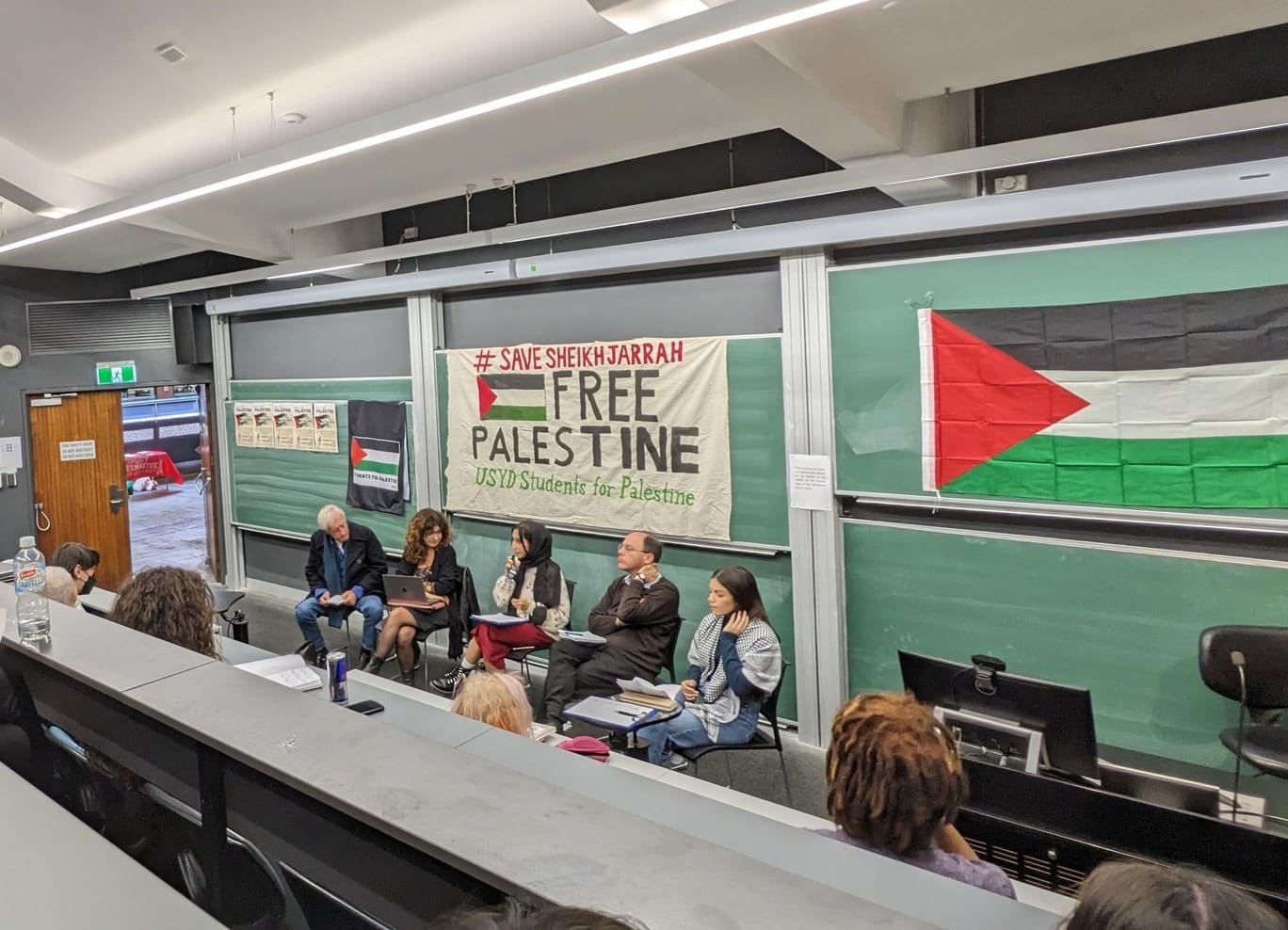Students and academics gathered to commemorate the 75th anniversary of Al-Nakba, when the international community allowed the start of a decades-long genocidal campaign against the Palestinian people which continues to this day.
The forum was chaired by SRC Global Solidarity Officer Jasmine Al-Rawi and the panel included Palestinian activist Ban Hasanin, USyd academics Dr. Nick Riemer and Dr. Lucia Sorbera, and UNSW academic Dr. Peter Slezak.
The vast majority of the lecture hall was filled, — the increased interest around Palestinian issues is a testament to the active efforts by the SRC and Student for Palestine this year.
The event began with an Acknowledgement of Country delivered by Al-Rawi, who directly connected the Palestinian liberation struggle with that of First Nations people in Australia in terms of land rights and equality.
Panellists shared their different pathways to becoming activists on this issue, and that diversity was an expression of the wide-ranging support this movement has globally. Hasanin discussed her personal experiences of “living in a state of catastrophe every day” because of what has been done to her people and argued these events were necessary because “we can commemorate this event in ways they [people in Palestine] cannot.”
Riemer centred his activism on Palestine being a “litmus test for progressives.” He articulated that “[because] there is an intense pressure on the left not to do anything about Palestine,” those who join the cause are also likely to push for anti-racist and anti-colonial causes more broadly. Sorbera agreed, remembering her experience in Italy during the 1970s, where all left-wing activism included an anti-Zionist element — something which has been lost today.
Much of the panel discussion revolved around the need to challenge and rewrite the historical narratives of Palestine. Slezak, who grew up in a Jewish community, pointed out the most shameful narrative used by Zionists — the use of the Holocaust to “excuse their crimes” toward the Palestinian people. The genocide, he noted, also didn’t start with the catastrophe in 1948, and is one part of a history of oppression.
Riemer added, “there is a direct link between the British colonial activity and the actions by Israeli security forces.”
Pro-Zionist narratives also extend to representation of the struggle for Palestinian liberation, with negotiations such as the Oslo Accords in 1993 legitimising Israel’s possession of the area. Slezak said, “negotiation is falling into the trap of the peace process.” The panel mentioned how prominent leftist activists like Edward Said broke with the Palestine Liberation Organisation (PLO) after the Oslo Accords for that very reason. For Slezak, it was simply “a liberation struggle, not a peace process.”
Al-Rawi then asked the panel about the new far-right movement in Israel who seem to be more extreme than previous governments, noting that the current head of Israeli security was “deemed too extreme for the Israeli military.” Sorbera argued “it’s not that much different from the past.” She and other panellists called out the left in Israel for its complicity in the oppression, noting “the [Israeli] Labour government in the 1990s did the same thing.” While the stated intentions of the Israeli state may have become more explicit, Riemer thinks this is largely an illusion, “The mask is off now (…) the early founders were clear in their intentions to take the whole area,” he explained.
The panel was clear in their view that all factions in Israeli political history must share the blame for this oppression.
Al-Rawi then turned the discussion towards Palestinian resistance in the face of decades of genocide. Sorbera argued that while armed resistance has been heavily covered, “much less has been said about the cultural resistance.” In particular, she emphasised that, while the Palestinian people had been “deprived of the structures to create a culture, they have been so successful anyway.”
The Palestinian-led Boycott, Divestment, Sanctions (BDS) movement was highlighted as a key form of international resistance. Riemer, who authored a book on the subject, explained its importance.“By shunning the state and the manifestations of the state it is a delegitimization movement… Israel relies on the majority western view that it is a colonial outpost in the Middle East,” he articulated.
Hasanin agreed, citing the boycott as key for recent ceasefire success in the occupation zones.
In sharing what people can do in Australia to support Palestine, Hasanin implored activists to “show up to events like this (…) support cultural initiatives (…) [and] most importantly, listen to Palestinians.”
Professor Sorbera added to “not hesitate to ruin the Christmas party,” highlighting that the suffering of Palestinians is worth breaking politeness and decorum.
At the end of the forum, students were urged to attend the Al-Nakba rally on Saturday 13 May.





